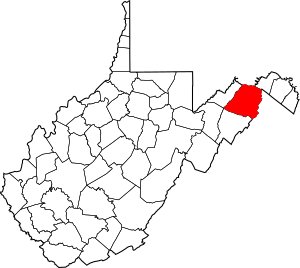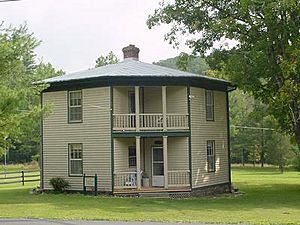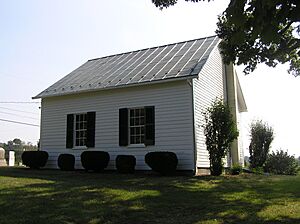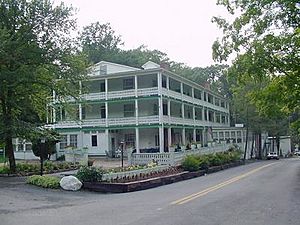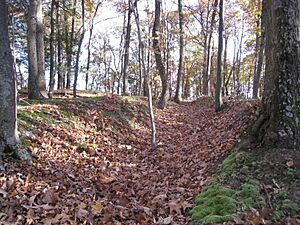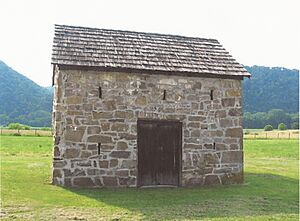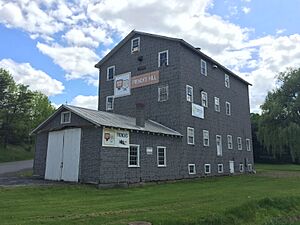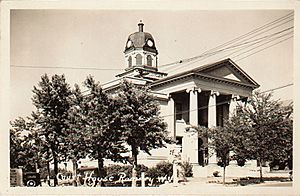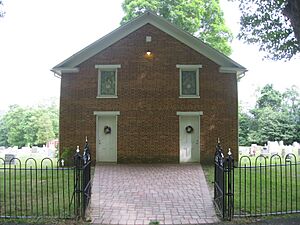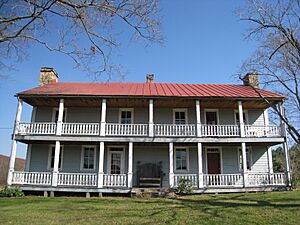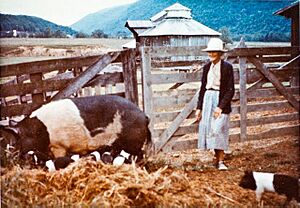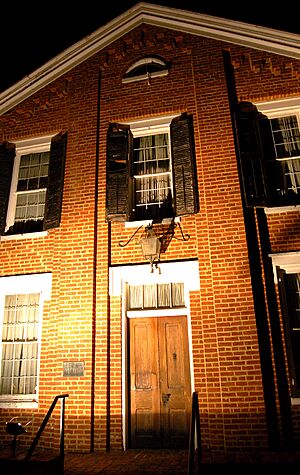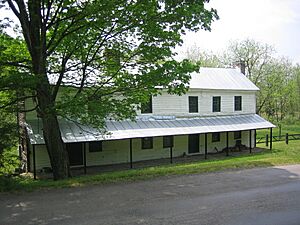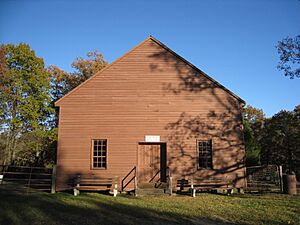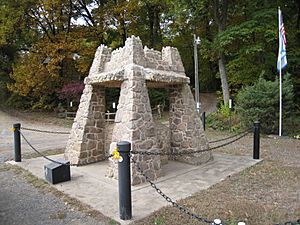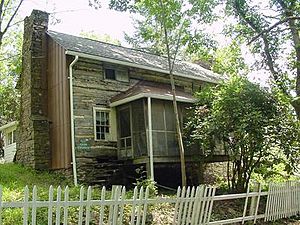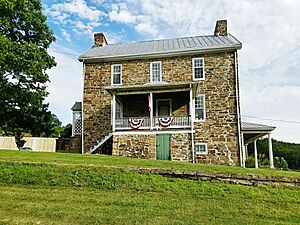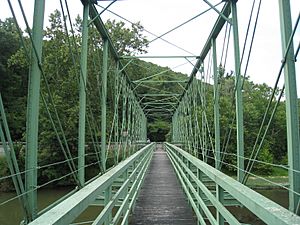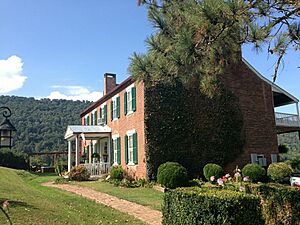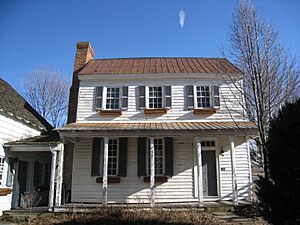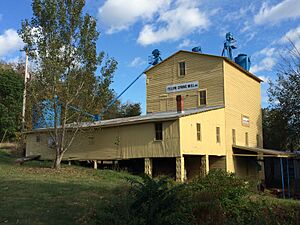National Register of Historic Places listings in Hampshire County, West Virginia facts for kids
Have you ever wondered about old buildings and places that have a special story? In Hampshire County, West Virginia, there are many amazing spots that are so important, they're listed on the National Register of Historic Places. This is like a special list kept by the United States government. It helps protect places that are important to history, architecture, or culture.
These places tell us about the past. They show us how people lived, worked, and even fought long ago. There are 28 different buildings and areas in Hampshire County on this list. Let's explore some of these cool historic sites!
Contents
- Discovering Hampshire County's Historic Gems
- The Brill Octagon House: A Unique Home
- Capon Chapel: A Place of Worship
- Capon Springs Resort: A Relaxing Getaway
- Fort Mill Ridge Civil War Trenches: Echoes of History
- Fort Van Meter: An Early Settlement Site
- French's Mill: A Working Mill of the Past
- Hampshire County Courthouse: A Center of Justice
- Hebron Church: A Community Landmark
- Hook's Tavern: A Traveler's Stop
- Kuykendall Polygonal Barn: An Unusual Farm Building
- Literary Hall: A Place for Learning
- North River Mills Historic District: A Whole Village with History
- Old Pine Church: A Quiet Place of History
- Pin Oak Fountain: A Roadside Landmark
- Scanlon Farm: A Glimpse into Farm Life
- Sloan-Parker House: A Grand Old Home
- Capon Lake Whipple Truss Bridge: An Engineering Marvel
- Valley View: A Home with a View
- Wilson-Wodrow-Mytinger House: A Home with Many Stories
- Yellow Spring Mill: Another Important Mill
- Images for kids
Discovering Hampshire County's Historic Gems
The Brill Octagon House: A Unique Home
Imagine living in a house shaped like an octagon! The Brill Octagon House is a very unusual home. It was built with eight sides, which was a popular but rare style in the mid-1800s. This house is located near Capon Springs. It's a great example of interesting old architecture.
Capon Chapel: A Place of Worship
The Capon Chapel is a historic church found near Capon Bridge. Churches like this often served as important community centers in the past. They were places where people gathered for worship, but also for social events and news. This chapel has stood for many years, watching over the community.
Capon Springs Resort: A Relaxing Getaway
For a long time, people have visited Capon Springs Resort to relax and enjoy the natural spring waters. This resort is a historic district, meaning many of its buildings and grounds are important. People believed the spring water had healing powers. It became a popular place for vacations and health treatments. It's still a place where people go to unwind today.
Fort Mill Ridge Civil War Trenches: Echoes of History
Near Romney, you can find the Fort Mill Ridge Civil War Trenches. These are actual trenches dug by soldiers during the American Civil War. They show us where battles took place and how soldiers defended their positions. Walking along these trenches helps you imagine what life was like for soldiers during that tough time.
Fort Van Meter: An Early Settlement Site
Fort Van Meter is another historic site near Romney. It's named after an early family who settled in the area. These old forts or homesteads were often built for protection in the early days of settlement. They remind us of the brave pioneers who first came to this part of West Virginia.
French's Mill: A Working Mill of the Past
French's Mill is located near Augusta. Mills like this were super important long ago. They used water power to grind grain into flour, which was a basic food for everyone. This mill shows us how people used natural resources to create what they needed. It's a peek into the industrial past of the region.
Hampshire County Courthouse: A Center of Justice
The Hampshire County Courthouse in Romney is where important legal and government decisions have been made for many years. Courthouses are often grand buildings because they represent law and order in a community. This building has seen a lot of history unfold within its walls.
Hebron Church: A Community Landmark
Hebron Church is a historic church located near Yellow Spring. Like Capon Chapel, it served as a spiritual and social hub for its community. Old churches often have beautiful architecture and tell stories of the people who built and worshipped in them over generations.
Hook's Tavern: A Traveler's Stop
Hook's Tavern near Capon Bridge was once a busy place. Taverns were like hotels and restaurants combined in the old days. Travelers would stop here to rest, eat, and get news before continuing their journeys. It shows us how people traveled and what services were available to them long ago.
Kuykendall Polygonal Barn: An Unusual Farm Building
The Kuykendall Polygonal Barn near Romney is another example of unique architecture. Instead of a typical rectangular barn, this one has many sides, making it "polygonal." Farmers built barns for storing crops and housing animals. This barn shows how people sometimes experimented with different designs for practical buildings.
Literary Hall: A Place for Learning
Literary Hall in Romney was a place dedicated to learning and culture. In the past, literary societies were popular. People would gather to read, discuss books, and give speeches. This hall was important for education and intellectual life in the community.
North River Mills Historic District: A Whole Village with History
The North River Mills Historic District is special because it's not just one building, but a whole area with many historic structures. This district gives us a picture of what a small village looked like and how it functioned many years ago. It includes homes, stores, and other buildings that tell a story together.
Old Pine Church: A Quiet Place of History
Old Pine Church near Purgitsville is another beautiful historic church. Its name suggests it might be surrounded by old pine trees, giving it a peaceful setting. These old churches often hold many memories for the families who have lived in the area for generations.
Pin Oak Fountain: A Roadside Landmark
The Pin Oak Fountain is a unique historic feature found near Pin Oak. Fountains like this were sometimes built as public water sources or as memorials. This one has been a landmark for travelers passing through the area for many years.
Scanlon Farm: A Glimpse into Farm Life
The Scanlon Farm near Three Churches represents the agricultural history of Hampshire County. Farms were the backbone of the economy for a long time. This farm helps us understand how people lived and worked the land in the past. It shows the importance of farming to the region's development.
Sloan-Parker House: A Grand Old Home
The Sloan-Parker House near Junction is a grand old home that shows how some wealthier families lived in the past. These houses often have unique architectural details and tell stories of the families who built them and the events they witnessed.
Capon Lake Whipple Truss Bridge: An Engineering Marvel
The Capon Lake Whipple Truss Bridge near Capon Lake is a special kind of bridge. A "Whipple truss" is a specific design that was strong and popular for bridges long ago. This bridge is important because it shows us old engineering skills and how people built ways to cross rivers and valleys.
Valley View: A Home with a View
Valley View is a historic home in Romney. Many old homes are listed on the National Register because of their unique architecture or their connection to important people or events. This house likely got its name from a beautiful view of the valley it overlooks.
Wilson-Wodrow-Mytinger House: A Home with Many Stories
The Wilson-Wodrow-Mytinger House in Romney is another historic residence. The name tells us it was home to several important families over time. Each family would have added their own stories and changes to the house, making it a rich part of local history.
Yellow Spring Mill: Another Important Mill
Just like French's Mill, the Yellow Spring Mill near Yellow Spring was vital for the community. It helped process food and goods, showing how local industries supported people's lives. These mills are reminders of a time before large factories, when communities relied on local production.
Images for kids


